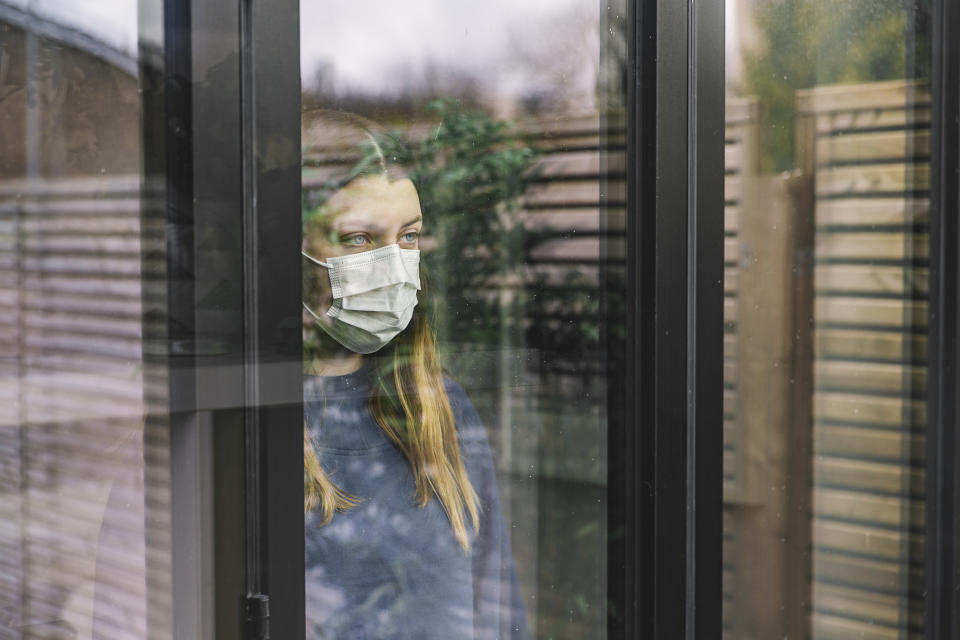Refusing to wear a face mask 'as taboo as drink-driving': what to do if a loved one refuses to wear one

Despite calls to group those who refuse to wear a mask in the same category as those who drink-drive or don’t wear a seatbelt, many people are choosing not to wear one.
And it is causing conflict within family and friendship groups who come down on opposing sides of the face mask wearing fence.
Venki Ramakrishnan, the president of the Royal Society and head of the UK’s national academy of sciences, recently called for the public to wear masks in all indoor public spaces and crowded outdoor areas, not just on public transport.
“Wearing a mask did not bother our Italian, French or Spanish neighbours; none of whom were used to wearing one before the pandemic, yet now do so routinely,” said Ramakrishnan, according to The Guardian.
“Treat it as another item of clothing that is part of the new normal and wear it whenever you cannot socially distance safely. It is the right thing to do, and a small price to pay, to help keep infections down and the economy open in the pandemic.”
Read more: UK's first face mask vending machines launch
Commenting as the Royal Society published two reports on face coverings, Prof Ramakrishnan said the public remained “sceptical” about their benefits because “the message has not been clear enough” and guidelines have not been consistent enough.
“What we would like for the government is to be a bit stronger and clearer about the messaging and require it whenever you are in crowded public spaces where you cannot get more than two metres away from the next person,”
“If you're in a crowded setting, you ought to wear a mask.”

A recent poll appears to highlight Ramakrishnan’s concern about some Britons not wearing face masks with 60% saying they would refuse to wear a face mask in a pub or restaurant – regardless of government advice.
The study, of 2,000 adults by Vision Direct, found 29% already feel embarrassed at the thought of wearing a mask when leaving the house.
And even though seven in 10 are prepared to don a face covering when going on public transport, 84% have no intention of wearing one when out walking, while three quarters won’t consider it for meeting family or friends.
A tenth of adults feel so strongly about the subject they claim they will refuse to wear a face mask anywhere in public, even if it became a law.
“There’s a variety of reasons people don’t wear mask,” explains Richard Reid, psychologist, author and founder of Pinnacle Therapy.
“Some feel there’s conflicting reports as to how effective they are and some people find them restrictive.”
Read more: How to look after your skin when wearing a face mask
Reid says another major reason for some in refusing to wear them is a reaction to the fact that they feel like it is enforced upon them.
“Our human nature tends to rail against things that feel that imposed.”
Of course the wearing or not wearing of a mask could cause conflict within households containing family members who hold differing opinions about the subject.
While one might happily don their face mask the minute they leave the house, another might refuse even if guidelines suggest they must wear one.
“It is always difficult to resolve conflict in families, and at this time, when many people are feeling anxious, fed-up, and adjusting to life in the ‘new-normal’ tensions can run particularly high,” explains psychologist Honey Langcaster-James.
“Some will see mask-wearing as the social responsible thing to do and feel judgemental if a family member refuses to wear one, but some will see them as an uncomfortable hinderance, or even as a constant reminder of a pandemic that causes them to feel anxious, and they may not see mask-wearing as important if they don't see the reasons behind it.
“This can lead arguments to erupt with some feeling judged and their personal freedom to be fronted, and others to see behaviour as selfish and inconsiderate.”
So what can we do if we find ourselves on opposite ends of the face mask wearing spectrum?
Reid suggests the worst approach to take is to head down the shaming route and suggests avoiding openly criticising a loved one for their refusal.
“This is likely to make them more entrenched in the behaviour and we’re more likely to get a very angry response back,” he explains.
Instead he suggests reinforce the positive behaviour of others.
“Give people positive acknowledgement to those who are wearing a mask or when someone gives us that space, maybe give them a nod of appreciation or a ‘thank you’,” he says.
Read more: How to help children get used to wearing a face mask or covering
And there are some other suggested methods of approach when a loved one refuses to wear a face mask.
Emphasise the mutual benefit
If someone isn’t wearing a mask or adhering to the one metre-plus rule, Reid suggests trying to focus on the mutual benefit to both parties. “Rather than saying ‘put a mask on’ we might say something like ‘for both of our benefits would it be okay if you just stepped back a bit please?’”
Reid says that by doing this we will be emphasising our need for distance but framing it in a way that shows concern for their wellbeing too.
“If we do it in that slightly gentler way, it becomes less about who’s right and who’s wrong and becomes about mutual concern and preference,” he says.
“Most people respond to the idea of pleasing people and if we’re doing that in a way rather than imposing our views onto theirs we are more likely to get the response that we want,” he adds.

Avoid heat-of-the-moment exchanges
Reid says it is important to reflect on how we’re feeling before we engage with loved ones about their non-mask wearing. That’s because in that moment the fear, anxiety or even anger is likely to come out in our mannerism which could spark a reaction in the other person.
“So, unless you are reasonably confident that you are in control of your emotions before you engage in those conversations it may be best to wait and not tackle it there and then and as frustrating as that might be, it means that the conversation doesn't snowball into something else,” Reid explains.
Read more: Jennifer Aniston shares face covering selfie urging fans to ‘wear a damn mask’
Be open about how them not wearing a mask makes you feel
According to Dr Alice Brown, chartered psychologist, from The Wellbeing Treehouse it is important to tell the other person how their not wearing a mask makes you feel in a non confrontational way.
“For example, ‘when you [don't wear a face mask/don’t stand 1-2 metres away], I feel [anxious/worried/scared/frustrated/angry] that I could catch the virus or spread it to someone who may not survive it, I would really like it if [you to wear a mask/follow social distancing rules], will you work with me to find a way that we are both comfortable with?’” she suggests.
Help them follow the rules
By having face masks on you that you can give to those who don’t have them. “If something is not important to someone they are less likely to remember to do it, it doesn't necessarily mean that they don’t care,” explains Dr Brown.
Explain your feelings in advance
Dr Brown says it may help to let family and friends know ahead of time how you feel and what you are comfortable with when you socialise with others.
Set your boundaries
This will help you take back some control of the situation. “We can only control our own actions, not those of others,” explains Dr Brown. “So if using strategies to encourage mask-wearing doesn’t work, then deciding on what your boundaries are and taking action if they are not followed (e.g. leaving somewhere if there are people without masks, or not letting people into your home unless they wear a mask) will help you feel better about the situation as you are putting yourself back in control.
“Feeling helpless in a situation is likely to trigger our stress response system,” she adds.
Don’t lecture
Try to resist the temptation to persuade and cajole or even to educate on the basis of the national guidelines or what rules might be in place, as this can come across as patronising and superior.
“It is sufficient to state that this is what you are asking, what your boundary is, and if they don't want to do that, then that’s their choice, but you can't spend time with them or invite them round or whatever,” advises Lancaster-James.
“This is a time when we are all adjusting and there is a lot of stress and uncertainty. We all need to put in place our own standards, within the guidelines and rules, and it’s okay if we don’t always see eye to eye.”



